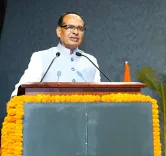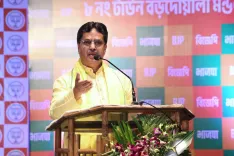Did the Maha Cabinet Approve the GST (Amendment) Bill for the Monsoon Session?

Synopsis
Key Takeaways
- The Maharashtra Cabinet approved the draft GST (Amendment) Bill.
- The amendment aims to align with central GST provisions.
- It facilitates the recovery of outstanding tax dues.
- The settlement period for arrears is from March 21 to December 31, 2025.
- Public Sector Undertakings will benefit from revised definitions in the act.
Mumbai, June 24 (NationPress) The Maharashtra Cabinet, led by Chief Minister Devendra Fadnavis, approved the draft bill to amend the Maharashtra Goods and Services Tax Act 2017 and its presentation during the forthcoming monsoon session of the state legislature.
In light of the adjustments made by the Central government to various sections and Schedule III of the Central Goods and Services Tax Act, 2017, these amendments were deemed necessary to align the Maharashtra Goods and Services Tax Act, 2017 with the latest provisions. This decision follows recommendations from the 55th meeting of the Goods and Services Tax Council and the passing of the Finance Act, 2025 on March 29, 2025.
The Cabinet has also sanctioned the presentation of the Maharashtra Goods and Services Tax (Amendment) Bill, 2025 in the upcoming monsoon session.
Additionally, the state Cabinet approved the draft of the Maharashtra (Amendment) Bill, 2025 regarding the Compromise of Arrears of Tax, Interest, Penalty or Late Fee applicable to Public Sector Undertakings, which will also be presented in the state legislature during the monsoon session.
This new act, effective from March 21, 2025, aims to facilitate the recovery of outstanding dues by the Goods and Services Tax Department. The settlement period is set from March 21 to December 31, 2025. The Act's definition of an applicant will be revised to include various Public Sector Companies, Public Sector Banks, and other government bodies, even if they do not fall under the Companies Act 2013.
This initiative is expected to resolve longstanding recovery cases by allowing the payment of settlement amounts, thereby generating overdue revenue for the government.








